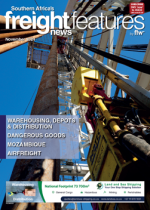Delagoa Shipping and Logistics, a key player in Mozambique's logistics and shipping industry, is marking a significant milestone as it approaches its 10th anniversary next year.Founded in 2015 by Ricardo Nhanzilo and Frederico Dengo, the company has expanded its operations from its initial base in Maputo to include offices in Beira, Nacala, and a smaller facility in Pemba. This expansion has enabled it to establish a wide presence across the country, facilitating its role as a major handler of bulk minerals."We handle around two million tons of bulk minerals out of Maputo," Nhanzilo told Freight News. The company has also diversified its services to include ship agency operations, managing five to six port calls per month, primarily for dry bulk vessels. "We do liquid bulk as well, where we handle a variety of products, including petroleum and vegetable oil.”Nhanzilo attributes much of Delagoa Shipping's success to the hands-on approach by management and deep local knowledge. "In Mozambique, local relationships and an understanding of the country's policies and regulations are critical. We focus heavily on skills development and training, ensuring our employees meet our standards," he said. The company prioritises hiring locally, investing in extensive in-house training, and absorbing trainees into full-time roles whenever possible.According to Nhanzilo, the Mozambican ports have seen ongoing upgrades, boding well for the overall logistics landscape. “Beira plays a key role in managing project cargo both locally and for the hinterland, as well as handling containerised imports and exports for our landlocked neighbouring countries, including granite exports from Zimbabwe. Nacala, on the other hand, specialises in liquid bulk and occasionally dry bulk, while also managing containerised export cargo, including both reefer and dry containers.”Despite the positive outlook and rising volumes, the logistics sector in Mozambique faces some challenges. "The shipping business is very cash-intensive, and with high interest rates at banks, managing cash f low is a constant challenge,” he said.Nhanzilo also highlighted improvements in the sector, such as the introduction of e-clearance, which has streamlined some processes. However, he pointed out that non-tariff barriers and a lack of intraregional trade continued to hinder growth. "There’s a lot of talk about harmonisation, but it’s not happening yet. We need to see more action in that area," he said.Looking ahead, Nhanzilo remains optimistic, particularly with the potential of upcoming gas projects to bring about positive change in the country. "Mozambique is a resilient country, and while change may be slow, there’s a lot of hope. It’s an election year and there's positivity in the air. We’re committed to facing challenges head-on and ensuring that people feel safe and secure here as we bring about long-term change for the country.” LV

